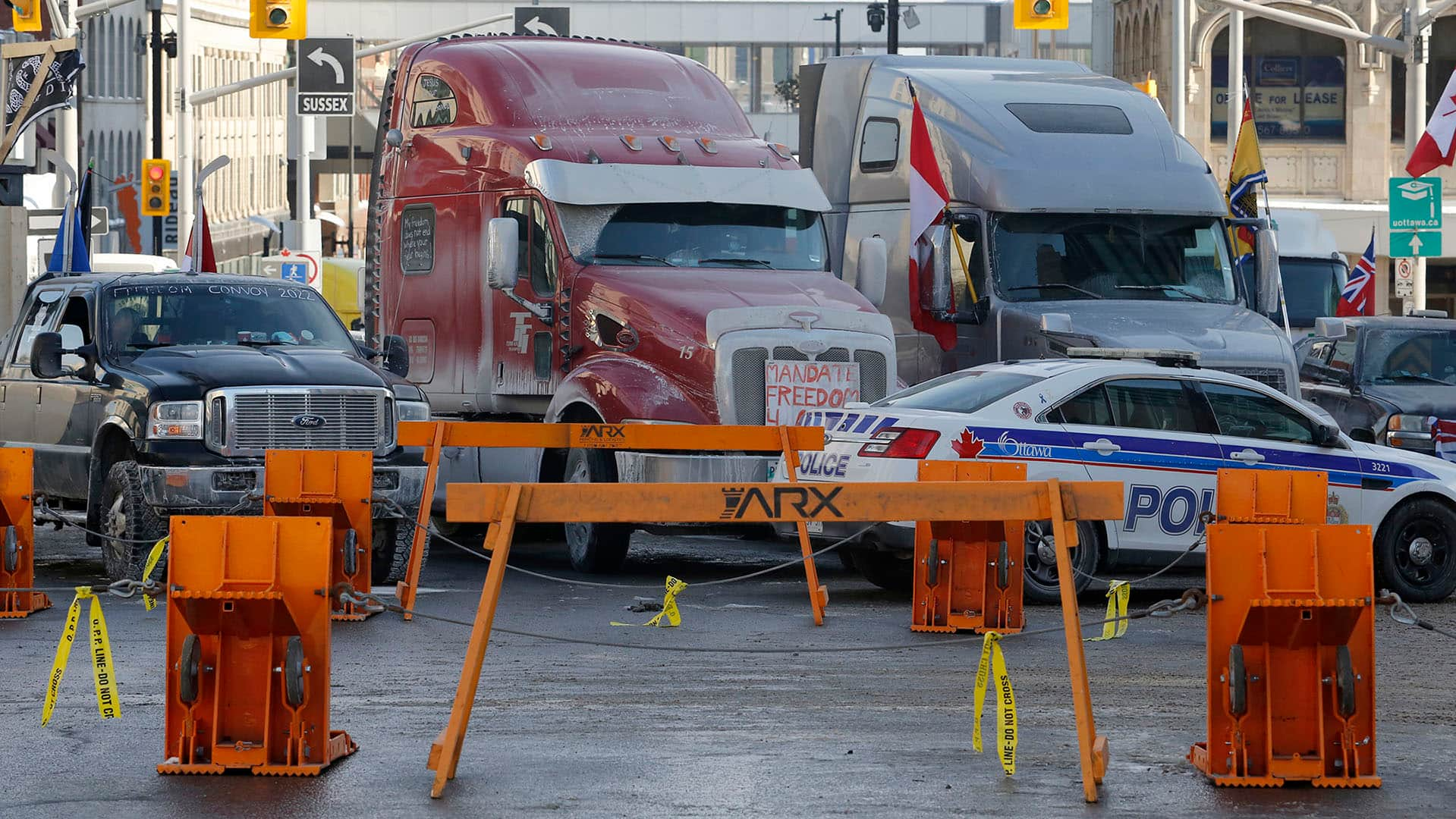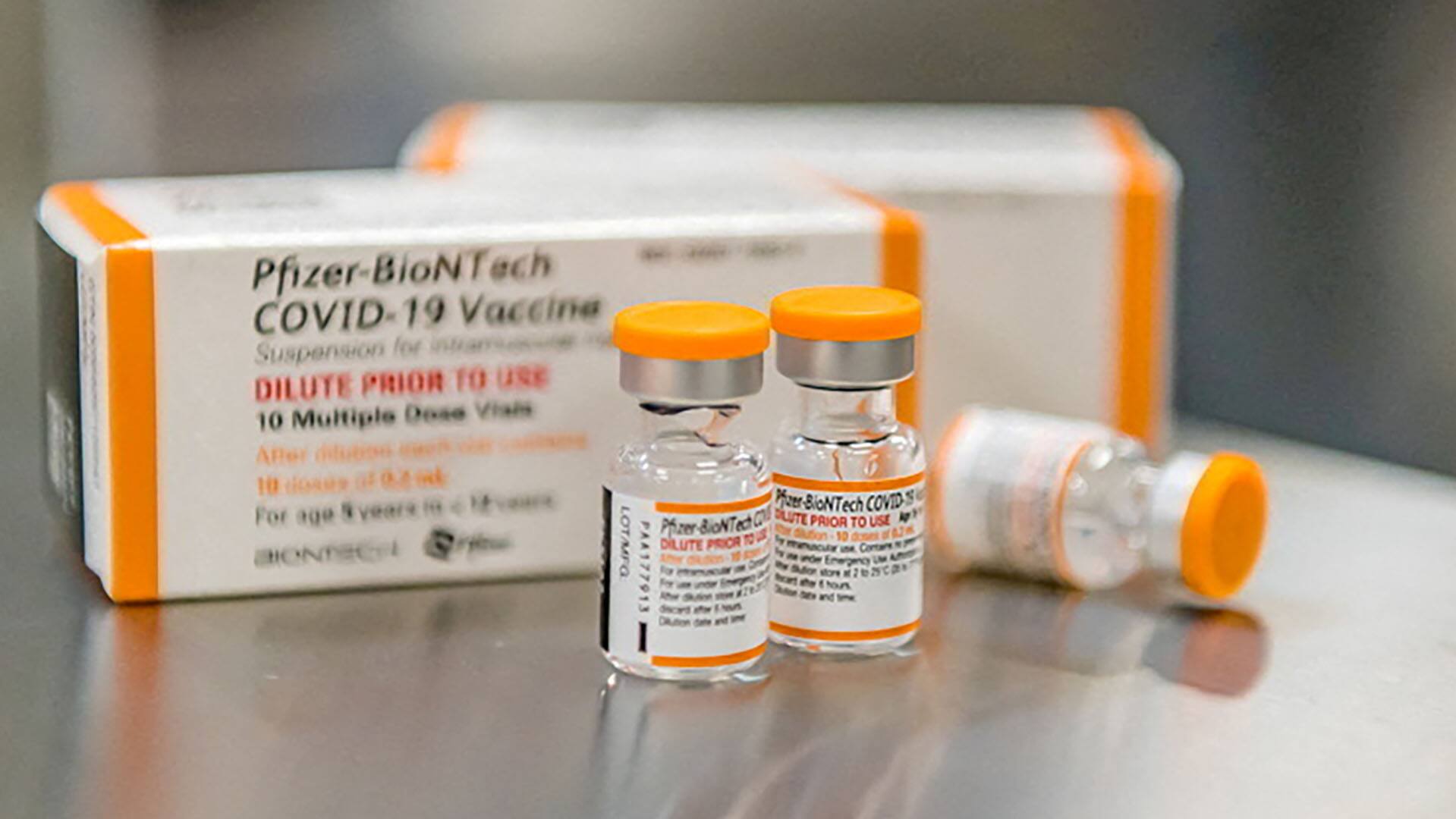The latest:
Some organizers of the convoy protest in Ottawa, which began as opposition to mandatory vaccination for cross-border truckers, said Wednesday they plan to remain “for as long as it takes.” Meanwhile, officials were calling for cooler heads to prevail after police said an assault took place at a trucker blockade at the Canada-U.S. border in southern Alberta.
In Ottawa, the protest has included vehicles parked and honking on roads leading to Parliament Hill since Friday. In recent days there have been reports of Ottawa residents feeling anxious and fearful amid the ongoing protest.
Police have announced three arrests for offences they say are related to the ongoing protests.
Crowds swelled to between 5,000 to 18,000 people on Saturday, according to police, with the city estimating another 3,000 came to the Hill on Sunday. Police said Tuesday night that 250 people remained, but did not offer a vehicle count.
The scope of the road closures and size of the area city officials say to avoid have dropped since Saturday, but both still take up swaths of residential and business districts. Many businesses and services have chosen to close.
On Wednesday, some protest organizers said they have empathy for the city’s residents, but insisted there’s no other way to end all COVID-19 public health mandates across Canada.
City officials say the protests outside Parliament Hill are costing roughly $1 million per day and the mayor is looking at ways to recover those costs, including a potential lawsuit against GoFundMe. 2:05
“Our message to the citizens of Ottawa is one of empathy,” wrote Chris Barber, who said he’s a senior convoy leader, in a Wednesday morning news release.
“We understand your frustration and genuinely wish there was another way for us to get our message across, but the responsibility for your inconvenience lies squarely on the shoulders of politicians who have [preferred] to vilify and call us names rather than engage in respectful, serious dialogue.”
Meanwhile, Alberta Premier Jason Kenney has called on protesters to end their demonstration in near the village of Coutts after police said some breached police barriers to join it Tuesday. Later, a head-on collision occurred, followed by an assault, police said.
“This kind of conduct is totally unacceptable,” Kenney said during a news conference in Edmonton. “Without hesitation, I condemn those actions and I call for calm.”

The protest of trucks lined up in front of the border checkpoint — the primary conduit for the approximately $6 billion in trade between Alberta and the U.S. — has halted all traffic at that location of Highway 4 since Saturday. The demonstration is tied to the nationwide protest over the federal vaccine mandate for cross-border truckers, which took effect last month.
The crash and alleged assault occurred after the RCMP announced earlier Tuesday that the Mounties would be clearing the roadblock outside the border crossing in Coutts, a village about 300 kilometres southeast of Calgary.
No arrests were made.
Kenney called for people to stay away from the area while the RCMP carried out their action against the blockade.
— From CBC News and The Canadian Press, last updated at 1 p.m. ET
What’s happening in the rest of Canada
With lab-based testing capacity deeply strained and increasingly restricted, experts say true case counts are likely far higher than reported. Hospitalization data at the regional level is also evolving, with several provinces saying they will report figures that separate the number of people in hospital because of COVID-19 from those in hospital for another medical issue who also test positive for COVID-19.
For more information on what is happening in your community — including details on outbreaks, testing capacity and local restrictions — click through to the regional coverage below.
You can also read more from the Public Health Agency of Canada, which provides a detailed look at every region — including seven-day average test positivity rates — in its daily epidemiological updates.
What’s happening around the world
As of Wednesday afternoon, more than 382.6 million cases of COVID-19 had been reported worldwide, according to Johns Hopkins University’s coronavirus tracker. The reported global death toll stood nearly 5.7 million.
In the Asia-Pacific region, Australia’s COVID-19 hospitalization rate fell to its lowest in nearly three weeks on Wednesday, while a steady rate of daily infections raised hopes the worst of an outbreak fuelled by the highly transmissible Omicron variant may have passed.
In the Middle East, Turkey has recorded 110,682 new COVID-19 infections in 24 hours, its highest daily figure of the pandemic, health ministry data showed on Wednesday. In late December, daily cases stood at about 20,000 but have since surged due to the Omicron variant of the coronavirus. Data also showed 217 people died due to COVID-19 in the same 24-hour period.
COVID-19 infections and deaths in the Americas are still increasing, but the rise in infections seems to be slowing down in places hit earliest by the Omicron variant, the Pan American Health Organization (PAHO) said on Wednesday.
Most of the seven million new cases reported in the past week were in North America (some four million new infections), while Chile and Brazil posted record numbers of daily cases, and deaths have more than doubled in Cuba, the Bahamas and Antigua and Barbuda, the regional health agency said.
Meanwhile, Pfizer on Tuesday asked the U.S. to authorize extra-low doses of its COVID-19 vaccine for children under five, potentially opening the way for the very youngest Americans to start receiving shots as early as March.
U.S. reports say Pfizer-BioNTech’s COVID-19 vaccine could get emergency approval for children aged six months to five years by the end of February, much earlier than expected. 2:05
In Europe, the Kremlin continues to hold off from imposing nationwide restrictions as Russian President Vladimir Putin acknowledged a “difficult” COVID-19 situation that has seen infection records for two weeks straight. The state coronavirus task force reported 141,883 new infections on Wednesday — a massive spike from the daily 15,000 cases recorded in early January.
A subset of the omicron variant, BA.2, has been also discovered in Russia. The BA.2 subset is widely considered stealthier than the original version and some scientists worry it could also be more contagious.
In Africa, health officials in South Africa on Tuesday reported 1,085 new cases of COVID-19 and 195 additional deaths. The country has now reported more than 3.6 million cases and more than 95,000 deaths since the start of the pandemic.
— From Reuters and The Associated Press, last updated at 1 p.m.







More Stories
Fair share: the right office solution can take finding the right partner
Ontario faces crew shortages, aircraft issues in fight against wildfires | Globalnews.ca
Refugee attends open house at Downtown Eastside affordable housing facility – BC | Globalnews.ca